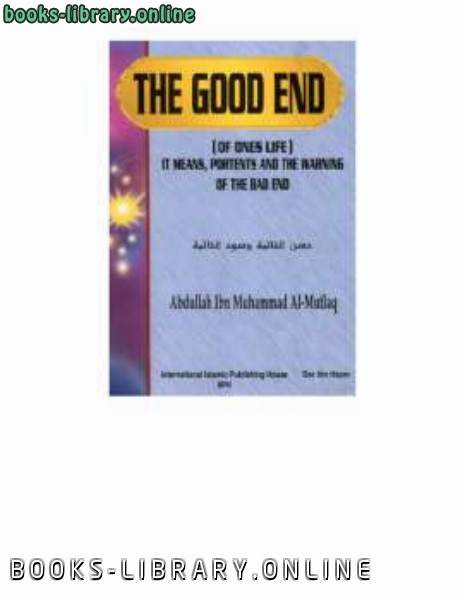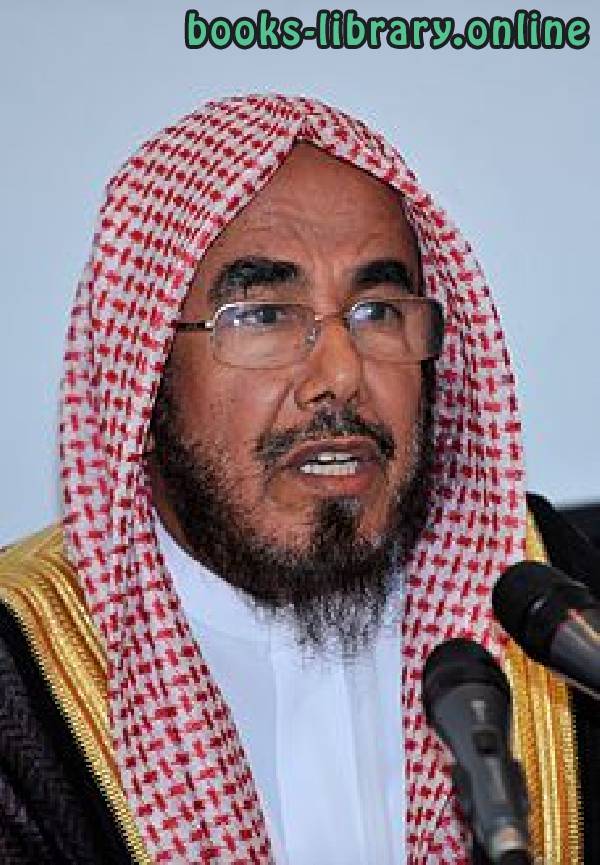📘 قراءة كتاب The Good End أونلاين


Praise be to Allah whose Mercy embraced each and every thing and who
keeps account of all things (i.e. He knows the exact number of every thing).
He had mercy on whom He willed through that which he enjoined (on them to
perform) on this world which (if they perform them) consequently raise their
ranks on the Hereafter, so they (Muslims) were perseverant in His obedience
and strove in His worship; if they are inflicted with calamities and show
patience it will be good for them (in the Hereafter), and if favours are
bestowed to them [by Allah] and they are thankful and grateful [for Allah], it
will be good for them in the Hereafter, and concerning them Allah said:
“Only those who are patient shall receive their
rewards in full, without reckoning”. [Az-Zumar (10)]
I bear witness that there is no true God but Allah who has no partner, and I
bear witness that Muhammad U is His Slave and Messenger who sent as a
mercy for the Alamin, prayers from Allah be on him, his household and his
reverend Companions.
A portion (of good) for a man in this world is his lifetime; if he makes good
use of it in things that benefit him in the eternal abode (Paradise), then his
trade will be of a great profit. But if he misuses it (his life) by committing sins
and disobedience till he meets Allah in such a state, he is surely of those who
are losers; how many of them in the graves?! He who is of a sound sense calls
himself for account before Allah calls him to account (on the Day of Account),
and fears his sins (and consequently get faraway from them) before they lead
him to destruction (i.e. HellFire). Ibn Mas'ood W said:
“The (true) believer sees his sins (and himself) as if he
is sitting at the side of a mountain which he fears it will
soon fall upon him” [Bukhari (11/88-89) and Muslim]
How many a man who persisted on committing a small sin and was familiar
with it and considered it to be nothing, and never thought of the greatness of
the One whom he (the sinner) disobeyed and so it (this small sin) was the
bad end (of his life and so he was admitted to Hell-Fire). Anas Ibn Malik W
said:
“You do deeds, which you consider smaller than a hair,
we used to consider as major sins at the time of Prophet
U” [Bukhari (11/283)]
Allah the All-Mighty drew the believers attention in the Holy Qur'an to the
importance of the good end (of one's life and deeds); He says:
“O you who believe! Fear Allah [by doing all that He
has ordered and by abstaining from all that He has
forbidden] as He should be feared, and die not except
in a state of Islam [as Muslims] with complete
submission to Allah.” (Qur'an 3: 102)
He also said:
“And worship your Rabb [Lord] until there comes unto
you the certainty [i.e. death].” (Qur'an 15: 99)
The order (in the previous verses) to fear Allah and worship Him (Alone)
continues till one dies so that good end (of one's life and deeds) could be
achieved. The Prophet U informed us that there are some people who strive in
doing obedience for a long time of their lives but shortly before they die they
commit sins and disobediences and end their lives in such a state (and
consequently they are admitted to Hell-Fire). The Prophet U said:
“A man may do deeds characteristic of the people of the
(Hell) Fire, so much so that there is only the distance of
a cubit between him and it, and then what has been
written (by the angel) surpasses, and so he starts doing
deeds characteristic of the people of Paradise and
enters Paradise. Similarly, a person may do deeds
characteristic of the people of Paradise, so much so that
there is only the distance of a cubit between him and it,
and then what has been written (by the angel) surpasses,
and he starts doing deeds of the people of (Hell-) Fire
and enters Hell-Fire.” [Bukhari (11/417), and Muslim Narration
no. (2643)- I translated the complete hadith for more benefit to the
reader (Translator)].
Sahl Ibn Sa'd As-Saidi W, narrated that during one of his battles, the Prophet
U encountered the disbelievers (polytheists, pagans, and idolaters), and the
two armies fought, and each of them turned to their army camps. Amongst
the (army of the) Muslims there was a man who would follow every single
isolated pagan and strike him with his sword. It was said: “O Allah's
Messenger! None has fought so satisfactory as so-and-so (namely, that brave
Muslim).” The Prophet U said: “He is from the dwellers of the Hell-Fire.”
Then a man from amongst the people said: "I will follow him and accompany
him in his fast and slow movements." The (brave) man got wounded, and
wanting to die at once; he put the handle of his sword on the ground and its
tip in between his breast, and then threw himself over it, committing suicide.
Then the man (who had watched the deceased) returned to the Prophet U,
and said: "I testify that you are the Messenger of Allah." The Prophet U said:
“What is this?!” The man told him the whole story. The Prophet U said:
“A man may do what may seem to the people as the
deeds of the dwellers of Paradise, but he is of the
dwellers of Hellfire and a man may do what may seem to
the people as the deeds of the dwellers of Hell-Fire,
but he is from the dwellers of Paradise.” [Fath al Bari the
explanation of Sahih Bukhari (7/538-4202) page 538. The first
edition of Dar Ar-Rayyan (1988)].
Allah the All-Mighty, described His believing slaves (in the Holy Qur'an) as the
ones who joined between fear of Allah's punishment and sincerity in worship
in their hearts. He the All-Mighty, said:
“Verily! Those who live in awe for fear of their Rabb
[Lord]; And those who believe in the Ayat [proofs,
verses, lessons,...] of their Rabb; And those who join
not anyone [in worship] as partners with Allah; And
those who give that [their charity] which they give
[and also do other good deeds] with their hearts full of
fear [whether their alms and charities are accepted or
not], because they are sure to return to their Rabb
[for reckoning]. It is those who race for good deeds
and they are foremost in them [e.g. offering the
compulsory, Salat [prayers] in their [early] stated,
fixed times and so on] (Qur'an 23: 57-61).
This was the state of the reverend Companions. Ahmad narrated from Abu
Bakr-As,Siddiq W that he said:
“I wish I was a hair in a believer's body.”
And he W used to hold his tongue and say:
“This is the thing that led me to the ways (of
destruction).”
: During his lifetime, man moves from one stage to the another beginning with childhood followed by his youth and ends with senility. During these stages, man encounters times of rest and distress as well as good health and other affairs. The author in this book has presented the causes of a good end i.e. eternal happiness etc.. One should not only remain hoping but he has to seek the means and ways to have a good end. Reading such books will help you to consciously seek to be one of the blessed people whom Allah will grant eternal happiness in Paradise.
حجم الكتاب عند التحميل : 558.9 كيلوبايت .
نوع الكتاب : pdf.
عداد القراءة:
اذا اعجبك الكتاب فضلاً اضغط على أعجبني و يمكنك تحميله من هنا:

شكرًا لمساهمتكم
شكراً لمساهمتكم معنا في الإرتقاء بمستوى المكتبة ، يمكنكم االتبليغ عن اخطاء او سوء اختيار للكتب وتصنيفها ومحتواها ، أو كتاب يُمنع نشره ، او محمي بحقوق طبع ونشر ، فضلاً قم بالتبليغ عن الكتاب المُخالف:
 قبل تحميل الكتاب ..
قبل تحميل الكتاب ..
يجب ان يتوفر لديكم برنامج تشغيل وقراءة ملفات pdf
يمكن تحميلة من هنا 'http://get.adobe.com/reader/'


 منصّة المكتبة
منصّة المكتبة 